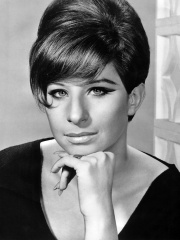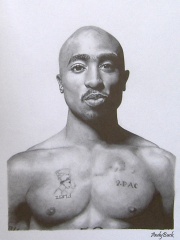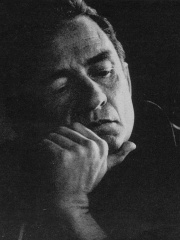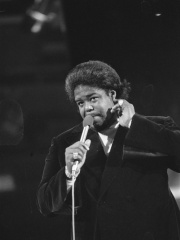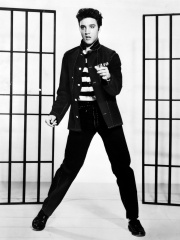

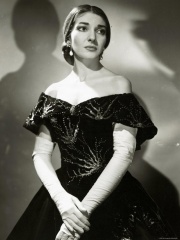
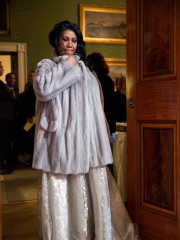
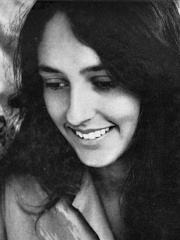
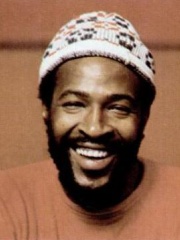
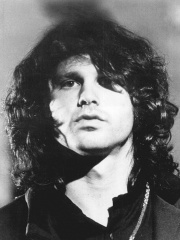

The Most Famous
SINGERS from United States
This page contains a list of the greatest American Singers. The pantheon dataset contains 4,381 Singers, 1,304 of which were born in United States. This makes United States the birth place of the most number of Singers.
Top 10
The following people are considered by Pantheon to be the top 10 most legendary American Singers of all time. This list of famous American Singers is sorted by HPI (Historical Popularity Index), a metric that aggregates information on a biography's online popularity. Visit the rankings page to view the entire list of American Singers.

1. Elvis Presley (1935 - 1977)
With an HPI of 87.57, Elvis Presley is the most famous American Singer. His biography has been translated into 184 different languages on wikipedia.
Elvis Aaron Presley (January 8, 1935 – August 16, 1977) was an American singer and actor. Referred to as the "King of Rock and Roll", he is widely regarded as one of the most culturally significant figures of the 20th century. Presley's energetic and sexually provocative performance style, combined with a mix of influences across color lines during a transformative era in race relations, brought both great success and initial controversy. Presley was born in Tupelo, Mississippi; his family moved to Memphis, Tennessee, when he was 13. He began his music career in 1954 at Sun Records with producer Sam Phillips, who wanted to bring the sound of African-American music to a wider audience. Presley, on guitar and accompanied by lead guitarist Scotty Moore and bassist Bill Black, was a pioneer of rockabilly, an uptempo, backbeat-driven fusion of country music and rhythm and blues. In 1955, drummer D. J. Fontana joined to complete the lineup of Presley's classic quartet and RCA Victor acquired his contract in a deal arranged by Colonel Tom Parker, who managed him for the rest of his career. Presley's first RCA Victor single, "Heartbreak Hotel", was released in January 1956 and became a number-one hit in the US. Within a year, RCA Victor sold ten million Presley singles. With a series of successful television appearances and chart-topping records, Presley became the leading figure of the newly popular rock and roll; though his performing style and promotion of the then-marginalized sound of African Americans led to him being widely considered a threat to the moral well-being of white American youth. In November 1956, Presley made his film debut in Love Me Tender. Drafted into military service in 1958, he relaunched his recording career two years later with some of his most commercially successful work. Presley held few concerts, and, guided by Parker, devoted much of the 1960s to making Hollywood films and soundtrack albums, most of them critically derided. Some of Presley's most famous films included Jailhouse Rock (1957), Blue Hawaii (1961), and Viva Las Vegas (1964). In 1968, he returned to the stage in the acclaimed NBC television comeback special Elvis, which led to an extended Las Vegas concert residency and several highly profitable tours. In 1973, Presley gave the first concert by a solo artist to be broadcast around the world, Aloha from Hawaii. Years of substance abuse and unhealthy eating severely compromised his health, and Presley died in August 1977 at his Graceland estate at the age of 42. Presley is one of the best-selling music artists in history, having sold an estimated 500 million records worldwide. He was commercially successful in many genres, including pop, country, rock and roll, rockabilly, rhythm and blues, adult contemporary, and gospel. Presley won three Grammy Awards, received the Grammy Lifetime Achievement Award at age 36, and has been posthumously inducted into multiple music halls of fame. He holds several records, including the most Recording Industry Association of America (RIAA)-certified gold and platinum albums, the most albums charted on the Billboard 200, the most number-one albums by a solo artist on the UK Albums Chart, and the most number-one singles by any act on the UK Singles Chart. In 2018, Presley was posthumously awarded the Presidential Medal of Freedom.

2. Cher (b. 1946)
With an HPI of 85.78, Cher is the 2nd most famous American Singer. Her biography has been translated into 100 different languages.
Cher ( SHAIR; born Cheryl Sarkisian, May 20, 1946) is an American singer and actress. Dubbed the "Goddess of Pop", she is known for her androgynous contralto voice, bold fashion and visual presentation, and multifaceted career. Her screen roles often reflect her public image as a strong-willed, outspoken woman. An influential figure in popular culture, Cher has sustained a career spanning more than six decades through continual reinvention. Cher rose to fame in 1965 as part of the folk rock duo Sonny & Cher, whose hit single "I Got You Babe" became emblematic of 1960s counterculture. She simultaneously launched a solo career with moody pop songs such as "Bang Bang (My Baby Shot Me Down)", whose theatrical storytelling foreshadowed her 1970s US Billboard Hot 100 number-one singles "Gypsys, Tramps & Thieves", "Half-Breed" and "Dark Lady". After a period of acting, she released the hair metal albums Cher (1987), Heart of Stone (1989) and Love Hurts (1991), scoring international number-one hits "If I Could Turn Back Time" and "The Shoop Shoop Song (It's in His Kiss)". At 52, she released the dance-pop album Believe (1998), which introduced the "Cher effect"—a stylized use of Auto-Tune to distort vocals. Its title track became 1999's number-one song in the US and the UK's best-selling single by a female artist. In the 21st century, she released her highest-charting US Billboard 200 albums, Closer to the Truth (2013) and Dancing Queen (2018), each debuting at number three. Cher became a TV star in the 1970s with The Sonny & Cher Comedy Hour and her solo variety show Cher, both on CBS, which drew more than 30 million weekly viewers. She later gained critical acclaim with her Broadway debut and the film adaptation of Come Back to the 5 & Dime, Jimmy Dean, Jimmy Dean (1982). Transitioning to film, she earned two Academy Award nominations—for Silkwood (1983) and Moonstruck (1987), winning Best Actress for the latter—and received the Cannes Film Festival's Best Actress Award for Mask (1985). Other starring roles include The Witches of Eastwick (1987), Mermaids (1990), If These Walls Could Talk (1996, her directorial debut), Tea with Mussolini (1999), Burlesque (2010) and Mamma Mia! Here We Go Again (2018). One of the best-selling music artists in history, Cher has sold over 100 million records and is the only solo artist with number-one singles on the US Billboard charts in seven consecutive decades (1960s–2020s). Her accolades include two Grammy Awards—among them the Grammy Lifetime Achievement Award—a Primetime Emmy Award, three Golden Globe Awards, the Billboard Icon Award and the Kennedy Center Honors. She is the only performer to have won an Academy Award for acting and been inducted into the Rock and Roll Hall of Fame. Her 2002–2005 Living Proof: The Farewell Tour was the highest-grossing concert tour by a female artist at the time, earning $250 million—about $400 million in 2024. Her life and career inspired the 2018 jukebox musical The Cher Show. Beyond entertainment, Cher is known for her progressive politics and advocacy for causes including LGBTQ rights and HIV/AIDS awareness.

3. Maria Callas (1923 - 1977)
With an HPI of 84.02, Maria Callas is the 3rd most famous American Singer. Her biography has been translated into 74 different languages.
Maria Callas (born Maria Anna Cecilia Sophia Kalogeropoulos; December 2, 1923 – September 16, 1977) was an American-born Greek soprano and one of the most renowned and influential opera singers of the 20th century. Many critics praised her bel canto technique, wide-ranging voice and dramatic interpretations. Her repertoire ranged from classical opera seria to the bel canto operas of Donizetti, Bellini, and Rossini, and further to the works of Verdi and Puccini, and in her early career to the music dramas of Wagner. Her musical and dramatic talents led to her being hailed as La Divina ("The Divine One"). Born in Manhattan and raised in Astoria, Queens, New York City, to Greek immigrant parents, she was raised by an overbearing mother who had wanted a son. Maria received her musical education in Greece at age 13 and later established her career in Italy. Forced to deal with the exigencies of 1940s wartime poverty and with near-sightedness that left her nearly blind on stage, she endured struggles and scandal over the course of her career. She underwent a mid-career weight loss, which might have contributed to her vocal decline and the premature end of her career. The press exulted in publicizing Callas's temperamental behavior, the alleged Callas–Tebaldi rivalry, and her love affair with Greek shipping tycoon Aristotle Onassis. Onassis's wife, Athina "Tina" Onassis Niarchos, divorced him when she discovered that he was having an affair with Callas. Although her dramatic life and personal tragedy have often overshadowed Callas the artist in the popular press, her artistic achievements were such that Leonard Bernstein called her "the Bible of opera", and her influence so enduring that, in 2006, Opera News wrote of her: "Nearly thirty years after her death, she's still the definition of the diva as artist—and still one of classical music's best-selling vocalists." Her ashes were scattered over the Aegean Sea on 3 June 1979, fulfilling one of her last wishes.

4. Aretha Franklin (1942 - 2018)
With an HPI of 83.92, Aretha Franklin is the 4th most famous American Singer. Her biography has been translated into 100 different languages.
Aretha Louise Franklin ( ə-REE-thə; March 25, 1942 – August 16, 2018) was an American singer, songwriter and pianist. Honored as the "Queen of Soul", she was twice named by Rolling Stone magazine as the greatest singer of all time. As a child, Franklin was noticed for her gospel singing at New Bethel Baptist Church in Detroit, Michigan, where her father C. L. Franklin was a minister. At the age of 18, she was signed as a recording artist for Columbia Records. While her career did not immediately flourish, Franklin found acclaim and commercial success once she signed with Atlantic Records in 1966. There, she recorded significant hit albums such as I Never Loved a Man the Way I Love You, Lady Soul and Aretha Now in the late 1960s and Young, Gifted and Black, Amazing Grace and Sparkle in the 1970s, before experiencing problems with the record company. Franklin left Atlantic in 1979 and signed with Arista Records, where her career was revived with the hit albums Jump to It, Who's Zoomin' Who?, Aretha and A Rose Is Still a Rose. Franklin is one of the best-selling music artists, with more than 75 million records sold worldwide. She charted 112 singles on the US Billboard charts, including 73 Hot 100 entries, 17 top-ten pop singles, 96 R&B entries and 20 number-one R&B singles. While her rendition of "Respect" has been referred to as her signature song, Franklin is known for other hit singles such as "(You Make Me Feel Like) A Natural Woman", "Chain of Fools", "Think", "I Say a Little Prayer", "Rock Steady", "Day Dreaming", "Freeway of Love" and "I Knew You Were Waiting (For Me)" (a duet with George Michael), to name a few. She also made a featured appearance in the 1980 musical-comedy film The Blues Brothers. Franklin received numerous honors throughout her career. She won 18 Grammy Awards out of 44 nominations, including the first eight awards given for Best Female R&B Vocal Performance (1968–1975), as well as a Grammy Living Legend Award and Lifetime Achievement Award. She was also awarded the National Medal of Arts and the Presidential Medal of Freedom. In 1987, she became the first female artist to be inducted into the Rock and Roll Hall of Fame. Her other inductions include the UK Music Hall of Fame in 2005, the Gospel Music Hall of Fame in 2012, and posthumously the National Women's Hall of Fame in 2020. In 2019, the Pulitzer Prize jury awarded her a posthumous special citation "for her indelible contribution to American music and culture for more than five decades".

5. Janis Joplin (1943 - 1970)
With an HPI of 83.91, Janis Joplin is the 5th most famous American Singer. Her biography has been translated into 85 different languages.
Janis Lyn Joplin (January 19, 1943 – October 4, 1970) was an American singer and songwriter. One of the most iconic and successful rock performers of her era, she was noted for her powerful mezzo-soprano vocals and her "electric" stage presence. In 1967, Joplin rose to prominence following an appearance at the Monterey Pop Festival, where she was the lead singer of the then little-known San Francisco psychedelic rock band Big Brother and the Holding Company. After releasing two albums with the band, she left Big Brother to continue as a solo artist with her own backing groups, first the Kozmic Blues Band and then the Full Tilt Boogie Band. She performed at the 1969 Woodstock Festival and on the Festival Express train tour. Five singles by Joplin reached the US Billboard Hot 100, including a cover of the Kris Kristofferson song "Me and Bobby McGee", which posthumously reached number one in March 1971. Her most popular songs include her cover versions of "Piece of My Heart", "Cry Baby", "Down on Me", "Ball and Chain", and "Summertime", as well as her original song "Mercedes Benz", which was her final recording. Joplin died of a heroin overdose in 1970, at the age of 27, after releasing three albums (two with Big Brother and the Holding Company and one solo album). A second solo album, Pearl, was released in January 1971, three months after her death. It reached number one on the Billboard 200. She was posthumously inducted into the Rock and Roll Hall of Fame in 1995. Rolling Stone ranked Joplin number 28 on its 2008 list of the "200 Greatest Singers of All Time", dropping to number 78 in the 2023 list. As of 2013, she remains one of the top-selling vocalists in the United States, with Recording Industry Association of America (RIAA) certifications of 18.5 million albums sold.

6. Joan Baez (b. 1941)
With an HPI of 83.48, Joan Baez is the 6th most famous American Singer. Her biography has been translated into 80 different languages.
Joan Chandos Baez (, Spanish: [ˈbaes]; born January 9, 1941) is an American singer, songwriter, musician, and activist. Her contemporary folk music often includes songs of protest and social justice. Baez has performed publicly for over 60 years, releasing more than 30 albums. Baez is generally regarded as a folk singer, but her music has diversified since the counterculture era of the 1960s and encompasses genres such as folk rock, pop, country, and gospel music. She began her recording career in 1960 and achieved immediate success. Her first three albums, Joan Baez, Joan Baez, Vol. 2 and Joan Baez in Concert, all achieved gold record status. Although a songwriter herself, Baez generally interprets others' work, having recorded many traditional songs and songs written by the Allman Brothers Band, the Beatles, Jackson Browne, Leonard Cohen, Woody Guthrie, Violeta Parra, the Rolling Stones, Pete Seeger, Paul Simon, Stevie Wonder, Bob Marley, and many others. She was one of the first major artists to record songs by Bob Dylan in the early 1960s; Baez was already an internationally celebrated artist and did much to popularize his early songwriting efforts. Her tumultuous relationship with Dylan later became the subject of songs by each of them and generated much public speculation. On her later albums she has found success interpreting the work of more recent songwriters, including Ryan Adams, Josh Ritter, Steve Earle, Natalie Merchant, and Joe Henry. Baez's songs include "Diamonds & Rust" and covers of Phil Ochs's "There but for Fortune" and the Band's "The Night They Drove Old Dixie Down". She also recorded "Farewell, Angelina", "Love Is Just a Four-Letter Word", "Forever Young", "Here's to You", "Joe Hill", "Sweet Sir Galahad" and "We Shall Overcome". Baez performed fourteen songs at the 1969 Woodstock Festival and has displayed a lifelong commitment to political and social activism in the fields of nonviolence, civil rights, human rights, and the environment. Baez was inducted into the Rock and Roll Hall of Fame on April 7, 2017.

7. Marvin Gaye (1939 - 1984)
With an HPI of 80.56, Marvin Gaye is the 7th most famous American Singer. His biography has been translated into 71 different languages.
Marvin Pentz Gaye Jr. (né Gay; April 2, 1939 – April 1, 1984) was an American R&B and soul singer, musician, songwriter, and record producer. He helped shape the sound of Motown in the 1960s, first as an in-house session player and later as a solo artist with a string of successes, which earned him the nicknames "Prince of Motown" and "Prince of Soul". Gaye is often considered one of the greatest singers of all time. Gaye's Motown hits include "How Sweet It Is (to Be Loved by You)" (1964), "Ain't That Peculiar" (1965), and "I Heard It Through the Grapevine" (1968). He also recorded duets with Mary Wells, Kim Weston, Tammi Terrell, and Diana Ross. During the 1970s, Gaye became one of the first Motown artists to break away from the reins of a production company and recorded the landmark albums What's Going On (1971) and Let's Get It On (1973). His later recordings influenced several R&B subgenres, such as quiet storm and neo soul. "Sexual Healing", released in 1982 on the album Midnight Love, won him his first two Grammy Awards. Gaye's last televised appearances were at the 1983 NBA All-Star Game, where he sang "The Star-Spangled Banner", Motown 25: Yesterday, Today, Forever in 1983, and on Soul Train. On April 1, 1984, Gaye intervened during a fight between his parents at their home in Western Heights, Los Angeles. Gaye's father, Marvin Gay Sr., subsequently shot and killed Gaye; it was the eve of his 45th birthday. Gay Sr. later pleaded no contest to voluntary manslaughter, receiving a six-year suspended sentence and five years of probation. Institutions have posthumously bestowed Gaye with such awards and honors as the Grammy Lifetime Achievement Award; a star on the Hollywood Walk of Fame; and inductions into the Rhythm and Blues Music Hall of Fame, Songwriters Hall of Fame, and Rock and Roll Hall of Fame.

8. Jim Morrison (1943 - 1971)
With an HPI of 80.55, Jim Morrison is the 8th most famous American Singer. His biography has been translated into 122 different languages.
James Douglas Morrison (December 8, 1943 – July 3, 1971) was an American singer-songwriter, and poet who was the lead vocalist and primary lyricist of the rock band the Doors. Due to his charismatic persona, poetic lyrics, distinctive voice, and unpredictable performances, along with the dramatic circumstances surrounding his life and early death, Morrison is regarded by music critics and fans as one of the most influential frontmen in rock history. Since his death, his fame has endured as one of popular culture's top rebellious and oft-displayed icons, representing the generation gap and youth counterculture. Together with keyboardist Ray Manzarek, Morrison founded the Doors in 1965 in Venice, California. The group spent two years in obscurity until shooting to prominence with its number-one hit single in the United States "Light My Fire", which was taken from the band's self-titled debut album. Morrison recorded a total of six studio albums with the Doors, all of which sold well and many of which received critical acclaim. He frequently gave spoken word poetry passages while the band was playing live. Manzarek said Morrison "embodied hippie counterculture rebellion". Morrison developed an alcohol dependency, which at times affected his performances on stage. In 1971, Morrison died unexpectedly in a Paris apartment at the age of 27, amid several conflicting witness reports. Since no autopsy was performed, the cause of Morrison's death remains disputed. Although the Doors recorded two more albums after Morrison died, his death greatly affected the band's fortunes, and they split up two years later. In 1993, Morrison was posthumously inducted into the Rock and Roll Hall of Fame along with the other Doors members. Rolling Stone, NME, and Classic Rock have ranked him among the greatest rock singers of all time.

9. Frank Sinatra (1915 - 1998)
With an HPI of 80.38, Frank Sinatra is the 9th most famous American Singer. His biography has been translated into 105 different languages.
Francis Albert Sinatra (; December 12, 1915 – May 14, 1998) was an American singer and actor. Nicknamed the "Chairman of the Board" and "Ol' Blue Eyes", he is regarded as one of the most popular entertainers of the 20th century. Born to Italian immigrants in Hoboken, New Jersey, Sinatra began his musical career in the swing era. He joined the Harry James band as the vocalist in 1939 before finding success as a solo artist after signing with Columbia Records four years later, becoming the idol of the "bobby soxers". In 1946, Sinatra released his debut album, The Voice of Frank Sinatra. He then signed with Capitol Records and released several albums with arrangements by Nelson Riddle, notably In the Wee Small Hours (1955) and Songs for Swingin' Lovers! (1956). In 1960, Sinatra left Capitol Records to start his own record label, Reprise Records, releasing a string of successful albums. He collaborated with Count Basie on Sinatra-Basie: An Historic Musical First (1962) and It Might as Well Be Swing (1964). In 1965, he recorded September of My Years and starred in the Emmy-winning television special Frank Sinatra: A Man and His Music. After releasing Sinatra at the Sands the following year, Sinatra recorded one of his most famous collaborations with Tom Jobim, Francis Albert Sinatra & Antonio Carlos Jobim. It was followed by 1968's Francis A. & Edward K. with Duke Ellington. Sinatra retired in 1971 following the release of "My Way" but came out of retirement two years later. He recorded several albums and released "New York, New York" in 1980. Sinatra is among the world's best-selling music artists, with an estimated 150 million record sales globally. Sinatra also forged a highly successful acting career. After winning the Academy Award for Best Supporting Actor for From Here to Eternity (1953), he starred in The Man with the Golden Arm (1955) and The Manchurian Candidate (1962). Sinatra also appeared in musicals such as On the Town (1949); Guys and Dolls (1955); High Society (1956); and Pal Joey (1957), the last of which won him a Golden Globe Award. Toward the end of his career, Sinatra frequently played detectives, including the title character in Tony Rome (1967) and the titular The Detective (1968). He received the Golden Globe Cecil B. DeMille Award in 1971. Sinatra also directed the anti-war drama None but the Brave (1965). On television, The Frank Sinatra Show began on CBS in 1950, and Sinatra continued to make appearances on television throughout the 1950s and 1960s. Sinatra was recognized at the Kennedy Center Honors in 1983, awarded the Presidential Medal of Freedom in 1985, and received the Congressional Gold Medal in 1997. He earned 11 Grammy Awards, including the Grammy Trustees Award, Grammy Legend Award, and the Grammy Lifetime Achievement Award. American music critic Robert Christgau called Sinatra "the greatest singer of the 20th century" and he continues to be regarded as an iconic figure.
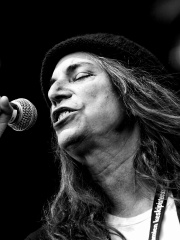
10. Patti Smith (b. 1946)
With an HPI of 79.15, Patti Smith is the 10th most famous American Singer. Her biography has been translated into 62 different languages.
Patricia Lee Smith (born December 30, 1946) is an American singer, songwriter, poet, painter, author, and photographer. Her 1975 debut album Horses made her an influential member of the New York City–based punk rock movement. Smith has fused rock and poetry in her work. In 1978, her most widely known song, "Because the Night," co-written with Bruce Springsteen, reached number 13 on the Billboard Hot 100 chart and number five on the UK Singles Chart. In 2005, Smith was named a Commander of the Ordre des Arts et des Lettres by the French Ministry of Culture. In 2007, she was inducted into the Rock and Roll Hall of Fame. In November 2010, Smith won the National Book Award for her memoir Just Kids, written to fulfill a promise she made to Robert Mapplethorpe, her longtime partner and friend. She is ranked 47th on Rolling Stone magazine's 100 Greatest Artists of all Time, published in 2010, and was awarded the Polar Music Prize in 2011.
People
Pantheon has 1,304 people classified as American singers born between 1850 and 2012. Of these 1,304, 939 (72.01%) of them are still alive today. The most famous living American singers include Cher, Joan Baez, and Patti Smith. The most famous deceased American singers include Elvis Presley, Maria Callas, and Aretha Franklin. As of April 2024, 125 new American singers have been added to Pantheon including Gary Cherone, Elvis Crespo, and Kim Hill.
Living American Singers
Go to all RankingsCher
1946 - Present
HPI: 85.78
Joan Baez
1941 - Present
HPI: 83.48
Patti Smith
1946 - Present
HPI: 79.15
Debbie Harry
1945 - Present
HPI: 78.41
Mariah Carey
1969 - Present
HPI: 77.86
Kanye West
1977 - Present
HPI: 76.53
Beyoncé
1981 - Present
HPI: 76.38
Barbra Streisand
1942 - Present
HPI: 76.35
Axl Rose
1962 - Present
HPI: 76.08
Jay-Z
1969 - Present
HPI: 75.88
50 Cent
1975 - Present
HPI: 74.50
Eminem
1972 - Present
HPI: 74.11
Deceased American Singers
Go to all RankingsElvis Presley
1935 - 1977
HPI: 87.57
Maria Callas
1923 - 1977
HPI: 84.02
Aretha Franklin
1942 - 2018
HPI: 83.92
Janis Joplin
1943 - 1970
HPI: 83.91
Marvin Gaye
1939 - 1984
HPI: 80.56
Jim Morrison
1943 - 1971
HPI: 80.55
Frank Sinatra
1915 - 1998
HPI: 80.38
Tina Turner
1939 - 2023
HPI: 78.83
Tupac Shakur
1971 - 1996
HPI: 78.51
Whitney Houston
1963 - 2012
HPI: 78.05
Johnny Cash
1932 - 2003
HPI: 77.25
Barry White
1944 - 2003
HPI: 76.76
Newly Added American Singers (2025)
Go to all RankingsGary Cherone
1961 - Present
HPI: 50.61
Elvis Crespo
1971 - Present
HPI: 49.17
Kim Hill
1970 - Present
HPI: 49.14
Rob Rock
1959 - Present
HPI: 48.90
Paul Baloff
1960 - 2002
HPI: 48.02
Mopreme Shakur
1967 - Present
HPI: 46.49
Benson Boone
2002 - Present
HPI: 45.79
Chappell Roan
1998 - Present
HPI: 45.59
Teddy Swims
1992 - Present
HPI: 45.50
Jonathan Knight
1968 - Present
HPI: 45.12
Bill Rieflin
1960 - 2020
HPI: 44.92
Snatam Kaur
1972 - Present
HPI: 44.36
Overlapping Lives
Which Singers were alive at the same time? This visualization shows the lifespans of the 25 most globally memorable Singers since 1700.





